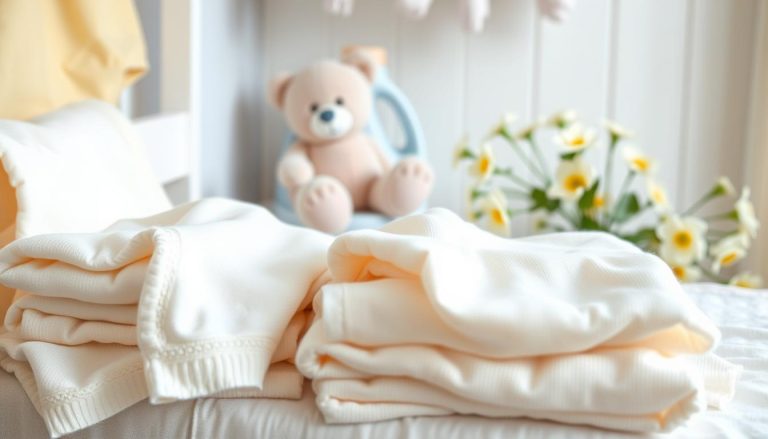As a parent, you want the best for your baby. This includes choosing the right laundry products for their delicate skin and clothes. Fabric softeners can have chemical components that might harm your baby. We’ll look at the top five reasons to avoid fabric softeners for baby clothes, including risks to flame retardancy and skin irritation.
Using fabric softeners for newborns might seem like a good idea. But, the truth is, these products can harm more than help. A 67% increase in skin irritation in babies due to fabric softeners shows their danger. Also, fabric softeners can make baby clothes more flammable. Avoiding fabric softeners for baby clothes keeps your baby safe and healthy.
In this article, we’ll explore safer alternatives for keeping your baby’s clothes soft and clean.
Table of Contents
Fabric Softeners for Baby Clothes: What’s Really Inside
As a parent, you want the best for your baby, including their clothes. You might wonder about fabric softeners and their impact on baby clothes. Fabric softeners often have silicone or quats to make clothes feel softer and reduce static. But these can be tough on your baby’s sensitive skin. That’s why many parents choose non-toxic or organic softeners.
Non-toxic softeners can lower the chance of skin irritation and allergies. Organic softeners for infants are a good choice because they’re made from natural stuff. When picking a softener, look for “fragrance-free” or “hypoallergenic” labels to avoid skin problems.
Common Chemical Components
Fabric softeners have chemicals like quats, silicones, and fragrances. These can be rough on your baby’s skin and might cause irritation or allergies. If you’re worried, try non-toxic or organic softeners instead.
How Softeners Interact with Fabric
Fabric softeners make fabrics feel softer by creating a thin film. But this film can make fabrics less breathable. This might cause skin irritation and discomfort. Non-toxic and organic softeners use natural stuff that’s kinder to your baby’s skin.
Risk Assessment for Infant Exposure
Using fabric softeners can be risky for your baby, mainly if they have sensitive skin. Opting for non-toxic or organic softeners can lower this risk. Look for products marked “safe for infants” or “gentle on skin” to avoid irritation or allergies.
The Hidden Dangers of Artificial Fragrances in Baby Laundry
Doing laundry for your baby means using the safest products. Many laundry items, like fabric softeners, have artificial fragrances. These can harm your baby’s skin and breathing. Gentle laundry softeners for babies are safer, but make sure they don’t have harsh chemicals or artificial scents.
Ingredients like phthalates in fragrances can cause health issues. Hypoallergenic fabric softeners for delicate skin reduce the chance of skin problems. Always check labels for “fragrance-free” or “hypoallergenic” to be safe.
Here are some risks from artificial fragrances in baby laundry:
- Skin irritation and allergic reactions
- Respiratory problems, such as asthma
- Reproductive issues, including birth defects
To keep your baby safe, use gentle laundry softeners and hypoallergenic fabric softeners. Always read labels and choose products without harsh chemicals or artificial fragrances. This simple change can protect your baby’s skin and breathing from harm.
| Product Type | Potential Risks | Safer Alternative |
|---|---|---|
| Fabric Softeners with Artificial Fragrances | Skin irritation, respiratory problems, reproductive issues | Gentle laundry softeners for babies, hypoallergenic fabric softeners for delicate skin |
How Fabric Softeners Reduce Flame Resistance in Baby Garments
As a parent, you want your baby’s clothes to be safe and not catch fire easily. But fabric softeners can make kids’ clothes more flammable. The U.S. Consumer Product Safety Commission (CPSC) says fabric softener can lower the flame resistance of clothes, like kids’ sleepwear.
Choosing the right fabric softener for your baby’s clothes is key. The American Cleaning Institute (ACI) warns against using fabric softeners on all performance fabrics. They suggest washing sportswear in cold water and drying it in the air. For natural softeners, white vinegar or baking soda are good choices. They are gentle and work well.
Safety Standards for Baby Clothing
There are strict rules for kids’ sleepwear sizes from nine months to size 6X. They must meet the 16 CFR Part 1615 flame resistance standard. Some states have even stricter rules for flame resistance in kids’ clothes. All kids’ pajamas sold in the U.S. must pass flame resistance tests set by law.
Impact of Softeners on Protective Properties
Fabric softeners can reduce the flame resistance in some fabrics, like kids’ sleepwear or synthetic materials. To keep fabrics absorbent, don’t use fabric softeners on towels, washcloths, or cloth diapers. Instead, use natural softeners or dryer balls to keep clothes soft.
Why Fabric Softeners Compromise Cloth Diaper Absorption
For cloth diapers, absorbency is very important. But, fabric softeners can make diapers less absorbent. This can cause leaks and make your baby uncomfortable. The buildup from fabric softeners can also lead to diaper rash.
To keep your baby’s diapers working well, try using fragrance-free softeners for baby garments. Or, you can add white vinegar to the wash. This natural option helps keep diapers soft without losing their absorbency.
Here are some tips for using cloth diapers effectively:
- Avoid using fabric softeners, as they can leave residues that reduce absorbency
- Use warm or hot water cycles below 95°F for regular washes to increase diaper lifespan
- Wash cloth diapers every 2-3 days to prevent the buildup of bacteria and odors
By following these tips and using Softeners for Baby Clothes wisely, you can keep your baby’s diapers effective and comfy. Always think about your baby’s sensitive skin. Take steps to avoid diaper rash and other irritations.
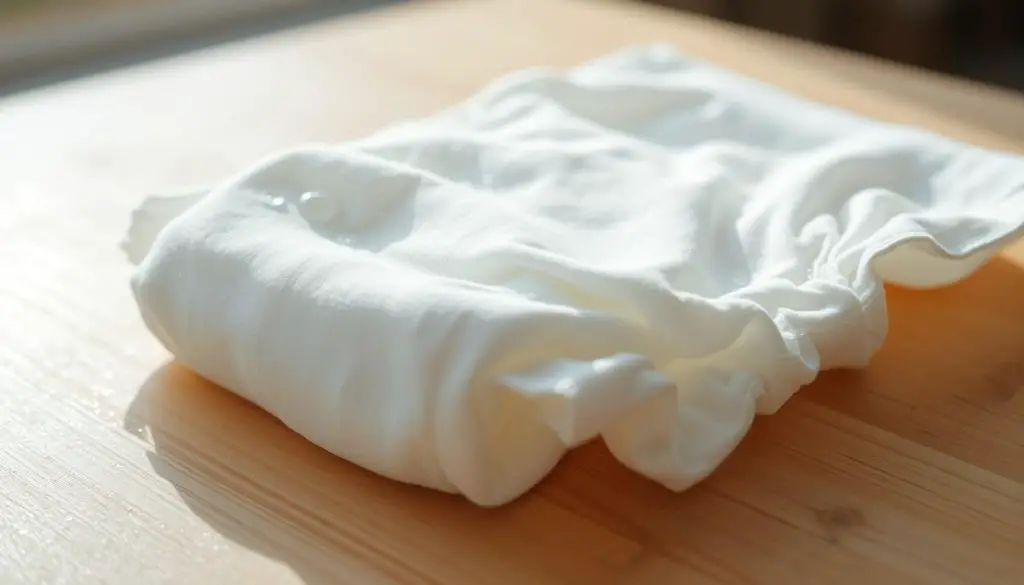
| Cloth Diaper Material | Absorbency Rate |
|---|---|
| Microfiber | Fastest absorbing |
| Cotton | Medium absorbency |
| Bamboo | Slow absorbency |
| Hemp | Slow absorbency |
The Environmental Impact of Baby Clothes Softeners
As a parent, you might worry about the environmental effects of products on your baby’s clothes. Traditional fabric softeners, made from petroleum, are bad for the planet. They release harmful gases like carbon dioxide, which harms our environment. Organic softeners for infants are a greener choice.
Some fabric softeners don’t break down in water and can clog up wastewater systems. Non-toxic baby clothes softeners are better for the planet. It’s key to pick softeners that are good for our water and air.
Water Pollution Concerns
Fabric softeners with toxic stuff like glutaral can hurt marine life. They also pollute our water and air. Choosing organic softeners for infants helps keep our water clean and safe for your baby.
Eco-friendly Alternatives
There are many non-toxic baby clothes softeners out there. Some are made from palm oil, but not all are good for the environment. Look for softeners that use palm oil that’s been certified by the Roundtable on Sustainable Palm Oil (RSPO). This way, you can help protect our planet for your baby’s future.
| Traditional Fabric Softeners | Organic Softeners for Infants |
|---|---|
| Petroleum-based, non-biodegradable | Sustainably sourced, biodegradable |
| Contribute to water pollution and air pollution | Gentler on the environment, reducing pollution |
How Softeners Affect Your Baby’s Sensitive Skin
As a parent, you want the best for your baby, including safe skin. Hypoallergenic fabric softeners for delicate skin might be a good choice. But, it’s key to know how they can affect your baby’s skin. Research shows 5%-11% of people can get allergic reactions from fragrances in tests.
Many parents choose gentle laundry softeners for babies to keep clothes soft. It’s important to pick products that are gentle. Even popular options like Tide Free and Dreft need careful label checking for hypoallergenic choices.
Here are some stats on what parents use for their baby’s laundry:
- 50% of respondents use fabric softener in their baby’s laundry
- 40% prefer using Tide Free detergent
- 30% use Costco’s version of “free” detergent
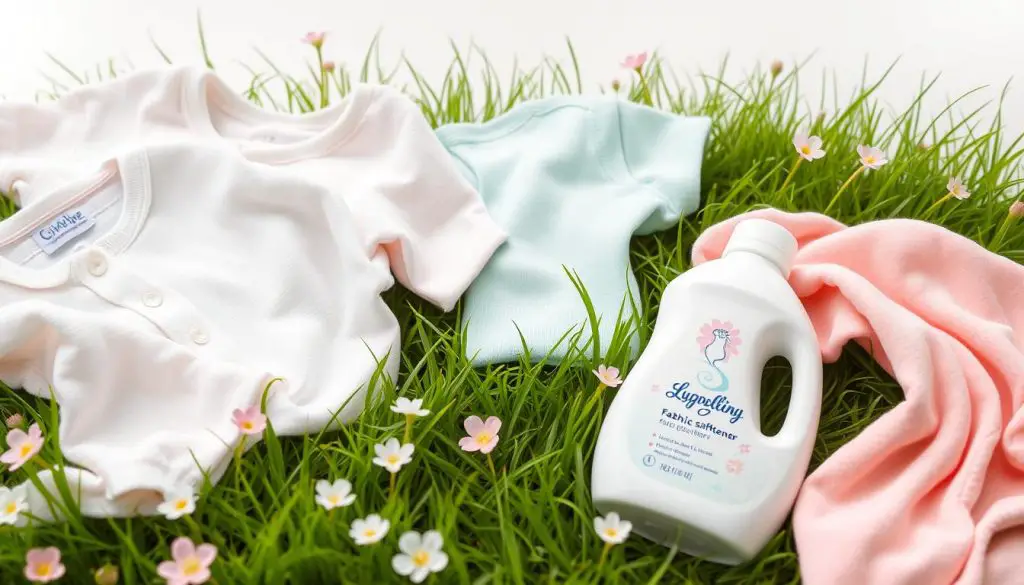
Your baby’s skin is delicate, and it’s your job to protect it. By picking hypoallergenic fabric softeners for delicate skin and gentle laundry softeners for babies, you can help keep their skin safe and healthy.
| Laundry Detergent | Percentage of Respondents |
|---|---|
| Tide Free | 40% |
| Costco’s “free” detergent | 30% |
| Dreft | 10% |
Natural Alternatives for Softer Baby Clothes
You don’t need commercial fabric softeners to keep your baby’s clothes soft. Natural softeners can work just as well without harsh chemicals. Vinegar is a simple and effective choice. Just add a cup of distilled white vinegar to the final rinse cycle.
Vinegar helps soften clothes and cuts down on static. Baking soda is another great option. It can neutralize odors and soften water, making it perfect for fabric softening. Add 1 cup of baking soda to the rinse cycle for these benefits.
Line drying your baby’s clothes also makes them softer and fresher. Sun drying is the best way to dry baby clothes. It avoids the damage that high heat from machine drying can cause. Using these natural methods in your laundry routine keeps your baby’s clothes soft and safe.
Other natural options include lemon juice for whitening, soap nuts for a natural saponin, and Epsom salts with baking soda for extra softening. These choices not only make clothes soft but also promote a healthier and greener laundry practice.
Best Practices for Washing Baby Clothes Without Softeners
Washing your baby’s clothes needs special care for their sensitive skin. Many parents choose best fabric softeners for newborns to keep clothes soft. But, it’s important to think about the risks of Softeners for Baby Clothes. Instead, use proper washing methods to keep clothes soft and safe for your baby.
To keep your baby’s clothes clean and soft without fabric softeners, try these tips:
- Wash baby clothes separately from the rest of the family, at least during the first 100 days.
- Use cold water and a gentle wash cycle to prevent damage and irritation.
- Choose a fragrance-free and hypoallergenic detergent made for baby clothes.
The aim is to keep your baby’s clothes clean, soft, and safe. By following these tips and avoiding fabric softeners, you protect your baby’s sensitive skin. This ensures their comfort and well-being.
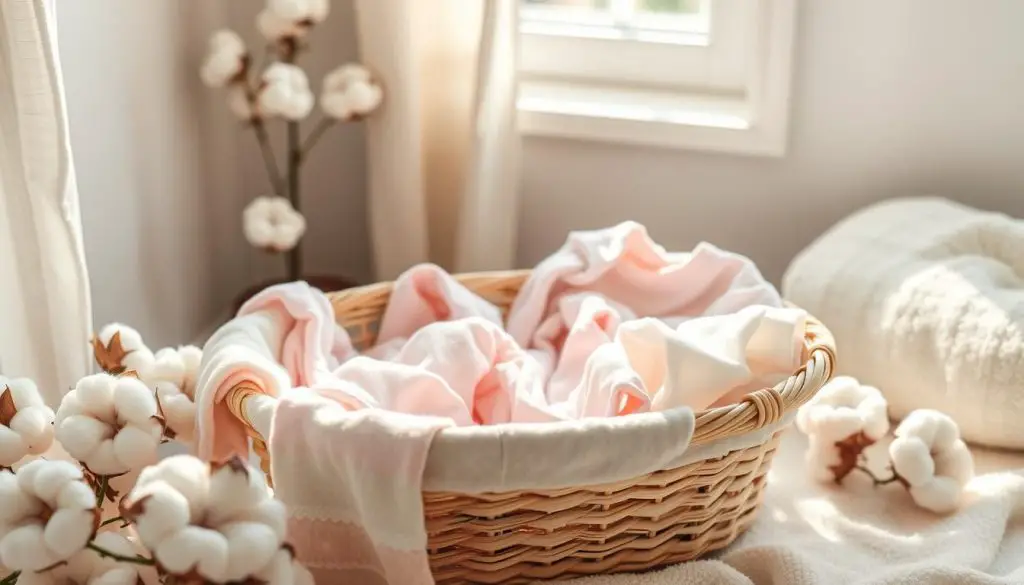
Signs Your Baby Is Sensitive to Fabric Softener Residue
As a parent, you want your baby’s clothes to be clean and comfy. But, some babies might react to fabric softener residue. This can lead to skin irritation and breathing problems. Look for hypoallergenic fabric softeners for delicate skin as a safer option. It’s key to know the signs of sensitivity first.
Common skin issues include redness, itching, and rashes. These can range from mild to severe. Fragrance-free softeners for baby clothes can help avoid these problems. Some babies might also cough or wheeze from inhaling fabric softener particles.
Common Skin Reactions
- Redness and inflammation
- Itching and scratching
- Rashes and skin lesions
Respiratory Symptoms
- Coughing and wheezing
- Shortness of breath
- Runny nose and congestion
If you think your baby is sensitive to fabric softener, act fast. Try hypoallergenic or fragrance-free softeners. Natural options like wool dryer balls or vinegar rinses can also help.
Every baby is unique, so what works for one might not for another. If worried about fabric softener sensitivity, talk to your pediatrician for advice.
| Product | Features | Benefits |
|---|---|---|
| Hypoallergenic Fabric Softener | Gentle, fragrance-free formula | Reduces skin irritation and respiratory symptoms |
| Fragrance-Free Softener | No dyes or fragrances | Minimizes risk of skin irritation and allergic reactions |
When to Consider Hypoallergenic Laundry Options
As a parent, you want the best for your baby, including their sensitive skin. If your baby’s skin is delicate or reacts to regular laundry products, it’s time to think about hypoallergenic fabric softeners for delicate skin. These softeners are made to reduce allergic reactions and skin irritation.
About 60% of babies have sensitive skin that can easily react to harsh chemicals in detergents. This can cause rashes, itching, and allergic reactions. Using hypoallergenic fabric softeners for delicate skin can lower the risk of these problems. Also, gentle laundry softeners for babies keep clothes clean and fresh without harsh chemicals.
Some benefits of using hypoallergenic laundry products include:
- Reduced risk of allergic reactions and skin irritation
- Gentle on baby’s delicate skin
- Minimizes the risk of detergent residue build-up
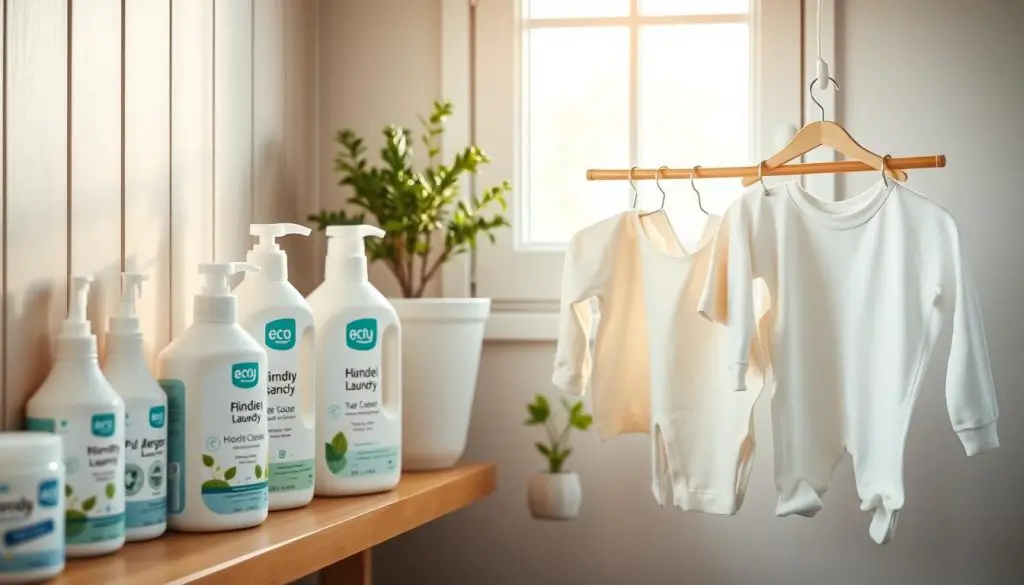
When picking a hypoallergenic laundry product, look for certifications and fragrance-free options. It’s key to follow the recommended dosages to avoid residue build-up. Switching to hypoallergenic fabric softeners for delicate skin and gentle laundry softeners for babies can help keep your baby’s skin healthy and happy.
| Laundry Product | Benefits |
|---|---|
| Hypoallergenic Fabric Softeners | Reduced risk of allergic reactions, gentle on delicate skin |
| Gentle Laundry Softeners for Babies | Minimizes risk of detergent residue build-up, keeps clothes clean and fresh |
Money-Saving Benefits of Skipping Fabric Softeners
As a parent, you want the best for your baby. That includes using organic softeners for infants or natural softeners for baby clothes. These keep their clothes soft and fresh. But, fabric softeners can be pricey and might not be good for your baby’s sensitive skin.
By skipping fabric softeners, you can save money. You also extend the life of your baby’s clothes.
Here are some ways to save money by skipping fabric softeners:
- Reduce your laundry expenses by not buying fabric softeners
- Extend the life of your baby’s clothes by not using fabric softeners that can reduce their quality
- Use the money you save to invest in natural softeners for baby clothes or other eco-friendly laundry products
Also, using organic softeners for infants or natural softeners for baby clothes is healthier for your baby’s skin. Many fabric softeners have harsh chemicals. These can irritate your baby’s skin and cause allergic reactions.
By choosing natural or organic softeners, you lower the risk of skin irritation. You keep your baby’s skin healthy.
Making the Switch: Your Guide to Safer Baby Laundry Care
Switching to baby-safe fabric softeners is simpler than you might think. Start by using natural alternatives like vinegar or baking soda. These options are gentle and non-toxic, keeping your baby’s clothes soft and comfy.
Before washing new baby clothes, pre-wash them to remove any residues or irritants. Choose gentle, dye-free detergents for sensitive infant skin. And remember, laundry baskets and hampers help keep things organized.
With a few simple changes, you can make laundry safer and more natural for your baby. Goodbye to harsh fabric softeners, hello to soft clothes your baby will love.
Related Articles:

